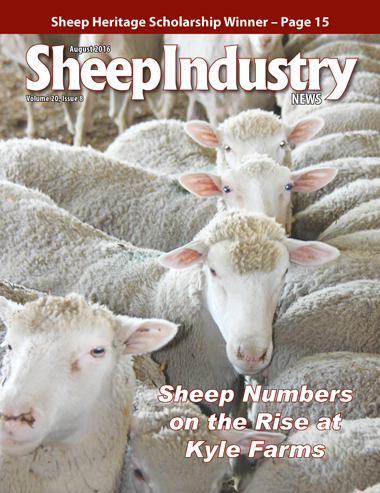
- August 2016
- President’s Notes
- Reverse Trade Missions Spur Wool Sales
- Population Explosion at Kyle Farm
- Wool Council Conducts Yearly Meeting
- No Transparency in Fed’s Sage Grouse Plans
- Posbergh Earns Foundation Scholarship
- Photo Contest Deadline Approaching
- Cuba Open to US Meat
- Q&A: Montana Sen. Steve Daines
- Around the States
- Market Report
- The Last Word
Question and Answer: Montana Sen. Steve Daines
A fifth-generation Montanan, Steve Daines brings 28 years of private-sector business experience to Washington, D.C., as he serves the people of Montana in the U.S. Senate. He is a lifelong sportsman and grew up in Bozeman, Mont. After attending public schools in Bozeman, Daines worked his way through college at Montana State University and graduated with a B.S. in Chemical Engineering. He was elected to serve as Montana’s United States Representative in 2012. In the U.S. Senate, Daines is working on issues of critical importance, such as managing and protecting public lands.
Q. What were your priorities in the recent interior appropriations language as they apply to the sheep industry?
A. When disasters like wildfires or drought strike, Montana’s sheep flocks are too often forced to find new or additional grazing fields due to damage caused by natural disasters. I’ve repeatedly pressed the U.S. Department of Agriculture and the U.S. Department of the Interior about the need to designate alternative grazing allotments for ranchers in such instances.
That’s why I secured language in appropriations that prevents wool growers from being punished for using available grazing allotments in the region if their land is deemed unusable by the Secretary of Interior due to natural causes. Additionally, my language requires federal agencies to improve transparency and collaboration with state and local counterparts, as well as wool growers and other stakeholders, regarding research and findings related to disease transmission.
Q. Do you see a continuing role for the U.S. Sheep Experiment Station in Dubois, Idaho?
A. Yes, I have worked to successfully fend off repeated attempts by USDA to shutter the U.S. Sheep Experiment Station.
The research done at this station, which is now celebrating its 100-year anniversary of serving wool growers in Montana and across the country, provides critical support and research for wool growers. The research done at the station has led to improvements in grazing techniques, disease fighting and sheep breeding, all of which are important for sheep producers in Montana and across the west. The station is good for Montana, and I’ll continue to work to stop any future attempts to close the station.
Q. You referred to BLM’s sage grouse plans for Montana as a “one-size-fits-none” plan. What can we do to balance federal, state and private landowner interests in our natural resources?
A. We can’t protect the sage grouse in a checkerboard-like fashion – after all, the birds can’t tell the difference between federal, state and private lands. I have serious concerns that the Obama administration’s plan will have a detrimental impact on Montana’s economy, our land users and Montanans’ way of life. It’s the people of Montana who know best how to manage our state’s resources, land and wildlife. That’s why the Obama administration should not implement another Washington-driven, one-size-fits-none policy on Montanans.
Q. As one of the top 10 sheep-producing states in the U.S., Montana and its congressional delegations have often been leaders in the country’s sheep industry. Why has it been so important for you, and those who proceeded you, to advocate on behalf of the Montana Wool Growers?
A. Agriculture is Montana’s number one industry, and our wool growers are an important and longstanding part of our state’s strong ag heritage. Montana is home to more than 25,000 farms and ranches, with products exported to the far corners of the world.
Even more, our family farms and ranches are the backbone of our rural communities, and it’s important that we support the next generation of Montana farmers and ranchers. That’s why it’s one of my highest priorities to fight for commonsense policies that provide certainty for our state’s ag producers and make it easy for them to continue to feed the world. As a Bobcat, I’m also proud to support Montana State University’s Wool Lab and the extensive research they do on new uses for wool, and I will continue to be an advocate of the program.

